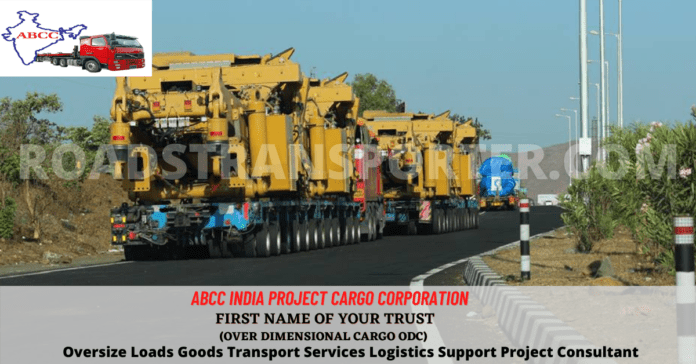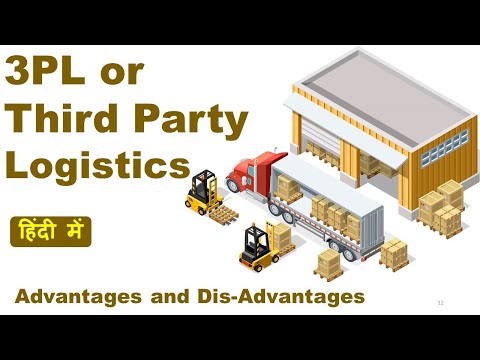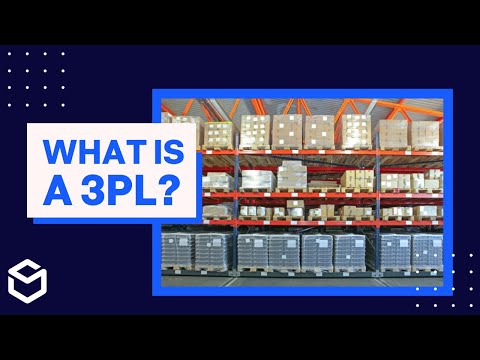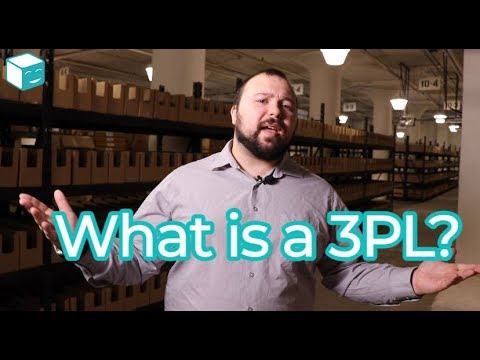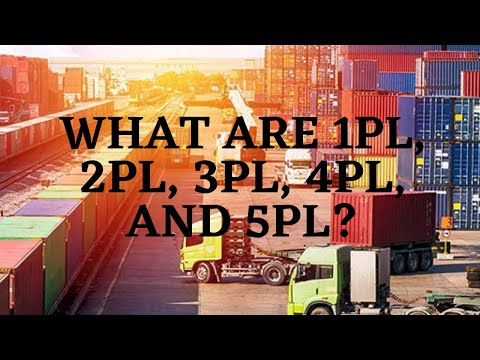Third-party logistics (3PL) is a business model in which a company outsources its logistics operations to a third-party provider. This can include warehousing, transportation, inventory management, and order fulfillment. 3PL providers offer a wide range of services, so businesses can choose the level of support that best meets their needs.
Here are some of the benefits of using a 3PL:
- Reduced costs: 3PL providers can often negotiate better shipping rates and other discounts than businesses can on their own.
- Improved efficiency: 3PL providers have the expertise and resources to streamline logistics operations, which can lead to faster order fulfillment and improved customer satisfaction.
- Increased focus on core competencies: By outsourcing logistics, businesses can free up their resources to focus on their core competencies, such as product development and marketing.
Some of the common 3PL services include:
- Warehousing: 3PL providers can provide warehouse space for storing inventory.
- Transportation: 3PL providers can arrange for the transportation of goods from the warehouse to the customer.
- Inventory management: 3PL providers can help businesses track their inventory levels and ensure that they have enough stock to meet demand.
- Order fulfillment: 3PL providers can pick, pack, and ship orders to customers.
- Value-added services: 3PL providers can also offer a variety of value-added services, such as returns processing, kitting, and labeling.
If you are considering outsourcing your logistics operations, it is important to compare different 3PL providers to find one that best meets your needs. You should consider factors such as the size and location of your business, the types of products you sell, and your budget.
Here are some of the top 3PL companies:
- FedEx Supply Chain
- DHL Supply Chain
- UPS Supply Chain Solutions
- Kuehne + Nagel
- CEVA Logistics
Industry Overview
what is third party logistics very easy words
I can explain third-party logistics (3PL) in very easy words.
Third-party logistics is when a company hires another company to do their shipping and logistics work. This can include things like storing inventory, picking and packing orders, and shipping them to customers.
Here is an example:
- A company that sells shoes might hire a 3PL to store their shoes in a warehouse. The 3PL would then pick and pack orders when customers buy shoes online, and ship them to the customers.
3PL can be a good option for companies that don’t want to handle their own shipping and logistics work. It can save them time and money, and it can free up their employees to focus on other things.
Here are some of the benefits of using a 3PL:
- Cost savings: 3PL providers can often negotiate better shipping rates and other discounts than businesses can on their own.
- Expertise: 3PL providers have the expertise and experience to handle logistics operations efficiently.
- Flexibility: 3PL providers can often adapt to changing needs quickly.
- Scalability: 3PL providers can scale their operations to meet the needs of growing businesses.
If you are considering using a 3PL, there are a few things you should keep in mind:
- Make sure the 3PL has the experience and expertise to handle your needs.
- Get quotes from multiple 3PL providers before making a decision.
- Be clear about your expectations with the 3PL.
why required 3pl logistics
There are many reasons why businesses may require 3PL logistics. Some of the most common reasons include:
- To save money: 3PL providers can often negotiate better shipping rates and other discounts than businesses can on their own. This can be a significant savings, especially for businesses that ship a lot of products.
- To improve efficiency: 3PL providers have the expertise and experience to streamline logistics operations. This can lead to faster order fulfillment and improved customer satisfaction.
- To focus on core competencies: By outsourcing logistics, businesses can free up their resources to focus on their core competencies, such as product development and marketing. This can help businesses to grow and be more competitive.
- To access new markets: 3PL providers can help businesses to access new markets by providing warehousing and transportation services in those markets. This can be a great way for businesses to expand their reach and grow their sales.
- To reduce risk: 3PL providers can help businesses to reduce risk by taking on the responsibility for logistics operations. This can free businesses up to focus on other aspects of their business, such as customer service.
Ultimately, the decision of whether or not to use a 3PL is a business decision. There are many factors to consider, such as the size and complexity of the business, the products being shipped, and the budget. However, for many businesses, 3PL logistics can be a valuable way to improve efficiency, save money, and focus on core competencies.
Here are some specific examples of when a business might need 3PL logistics:
- A new business that is just starting out may not have the resources to handle its own logistics operations.
- A business that is expanding into new markets may need help with warehousing and transportation.
- A business that is experiencing high growth may need to outsource its logistics to keep up with demand.
- A business that is facing seasonal fluctuations in demand may need to use 3PL logistics to manage those fluctuations.
- A business that is looking to improve its customer service may use 3PL logistics to offer faster and more reliable delivery.
If you are considering using a 3PL, there are a few things you should keep in mind:
- Do your research: There are many different 3PL providers, so it is important to do your research and find one that is a good fit for your needs.
- Get quotes from multiple providers: Once you have found a few 3PL providers that you are interested in, get quotes from each one. This will help you to compare prices and services.
- Be clear about your expectations: Before you sign a contract with a 3PL, be clear about your expectations. This includes things like the level of service you expect, the turnaround time you need, and the cost.
3pl logistics examples
here are some examples of 3PL logistics:
- A clothing retailer might hire a 3PL to store its inventory in a warehouse. The 3PL would then pick and pack orders when customers buy clothes online, and ship them to the customers.
- A furniture company might hire a 3PL to handle the transportation of its furniture from the factory to the retail stores. The 3PL would also handle the loading and unloading of the furniture, as well as the documentation and customs clearance.
- A food manufacturer might hire a 3PL to manage its cold chain logistics. This would involve ensuring that the food is kept at the correct temperature throughout the supply chain, from the factory to the customer’s refrigerator.
- A pharmaceutical company might hire a 3PL to handle the distribution of its drugs. This would involve ensuring that the drugs are stored in a secure environment and that they are shipped in a timely manner.
- An e-commerce company might hire a 3PL to handle its order fulfillment. This would involve picking, packing, and shipping orders to customers.
These are just a few examples of 3PL logistics. The specific services that a 3PL provider offers will vary depending on the needs of the business.
3pl logistics companies in india
There are many 3PL logistics companies in India, offering a wide range of services to businesses of all sizes. Here are some of the top 3PL companies in India:
- FM Logistic India: FM Logistic is a global 3PL company with operations in over 150 countries. In India, FM Logistic offers a wide range of services, including warehousing, transportation, and supply chain management.
- Mahindra Logistics: Mahindra Logistics is a leading 3PL company in India with over 50 years of experience. The company offers a wide range of services, including warehousing, transportation, and supply chain management.
- Ekart Logistics: Ekart Logistics is a 3PL company that is part of the Flipkart group. The company offers a wide range of services, including warehousing, transportation, and last-mile delivery.
- Blue Dart Express: Blue Dart Express is a leading express delivery company in India. The company also offers 3PL services, including warehousing and transportation.
- DTDC: DTDC is another leading express delivery company in India. The company also offers 3PL services, including warehousing and transportation.
These are just a few of the many 3PL companies in India. When choosing a 3PL company, it is important to consider the specific needs of your business, such as the type of products you sell, the size of your business, and your budget.
difference between contract logistics and 3pl
Contract logistics and 3PL are both terms used to describe the outsourcing of logistics services to a third-party provider. However, there are some key differences between the two.
Contract logistics is a more specialized type of 3PL that focuses on a specific aspect of the supply chain, such as warehousing, transportation, or order fulfillment. Contract logistics providers typically have a deep understanding of the specific industry or market they serve, and they can offer a high level of expertise and customization.
3PL is a broader term that can refer to any type of outsourcing of logistics services. 3PL providers can offer a wide range of services, from warehousing and transportation to inventory management and supply chain planning. 3PL providers typically have a wider range of experience and expertise than contract logistics providers, but they may not be able to offer the same level of customization.
Here is a table that summarizes the key differences between contract logistics and 3PL:
| Feature | Contract logistics | 3PL |
|---|---|---|
| Focus | Specific aspect of the supply chain | Wide range of logistics services |
| Expertise | Deep understanding of the specific industry or market | Wider range of experience and expertise |
| Customization | High level of customization possible | Less customization possible |
| Cost | Typically more expensive than 3PL | Typically less expensive than contract logistics |
The best choice for a business will depend on its specific needs and requirements. If a business needs a high level of expertise and customization in a specific area of the supply chain, then contract logistics may be the best option. If a business needs a wider range of logistics services at a lower cost, then 3PL may be the better choice.
Here are some examples of when each type of outsourcing might be a good fit:
Contract logistics: A clothing retailer might hire a contract logistics provider to manage its warehousing and transportation services. This would allow the retailer to focus on its core competencies, such as product design and marketing.
3PL: An e-commerce company might hire a 3PL to handle its order fulfillment. This would allow the company to scale its operations quickly and easily, without having to invest in its own warehouse and transportation network.
Ultimately, the decision of whether to use contract logistics or 3PL is a business decision. There are many factors to consider, such as the size and complexity of the business, the products being shipped, and the budget. However, for many businesses, outsourcing logistics can be a valuable way to improve efficiency, save money, and focus on core competencies.
What is 3PL and 4PL in logistics?
3PL and 4PL are two types of logistics outsourcing services.
3PL (Third-Party Logistics) is a business model in which a company outsources its logistics operations to a third-party provider. This can include warehousing, transportation, inventory management, and order fulfillment. 3PL providers offer a wide range of services, so businesses can choose the level of support that best meets their needs.
4PL (Fourth-Party Logistics) is a business model in which a company outsources its entire logistics function to a third-party provider. The 4PL provider takes responsibility for all aspects of the logistics process, from planning and design to execution and monitoring.
Here is a table that summarizes the key differences between 3PL and 4PL:
| Feature | 3PL | 4PL |
|---|---|---|
| Focus | Specific logistics operations | Entire logistics function |
| Services | Warehousing, transportation, inventory management, order fulfillment | Planning, design, execution, monitoring |
| Expertise | Varies depending on the provider | Deep understanding of the entire logistics process |
| Cost | Typically less expensive than 4PL | Typically more expensive than 3PL |
| Flexibility | More flexible than 4PL | Less flexible than 3PL |
The best choice for a business will depend on its specific needs and requirements. If a business needs a specific logistics service, such as warehousing or transportation, then 3PL may be the best option. If a business needs a complete logistics solution, then 4PL may be the better choice.
Here are some examples of when each type of outsourcing might be a good fit:
3PL: A small business that is just starting out might hire a 3PL to handle its warehousing and transportation services. This would allow the business to focus on its core competencies, such as product development and marketing.
4PL: A large enterprise that is expanding into new markets might hire a 4PL to manage its entire logistics function. This would allow the enterprise to scale its operations quickly and easily, without having to invest in its own logistics infrastructure.
Ultimately, the decision of whether to use 3PL or 4PL is a business decision. There are many factors to consider, such as the size and complexity of the business, the products being shipped, and the budget. However, for many businesses, outsourcing logistics can be a valuable way to improve efficiency, save money, and focus on core competencies.
3pl logistics advantage
There are many advantages to using 3PL logistics. Here are some of the most common:
Cost savings: 3PL providers can often negotiate better shipping rates and other discounts than businesses can on their own. This can be a significant savings, especially for businesses that ship a lot of products.
Improved efficiency: 3PL providers have the expertise and experience to streamline logistics operations. This can lead to faster order fulfillment and improved customer satisfaction.
Focus on core competencies: By outsourcing logistics, businesses can free up their resources to focus on their core competencies, such as product development and marketing. This can help businesses to grow and be more competitive.
Access to new markets: 3PL providers can help businesses to access new markets by providing warehousing and transportation services in those markets. This can be a great way for businesses to expand their reach and grow their sales.
Reduce risk: 3PL providers can help businesses to reduce risk by taking on the responsibility for logistics operations. This can free businesses up to focus on other aspects of their business, such as customer service.
Improved visibility: 3PL providers can provide businesses with real-time visibility into their shipments. This can help businesses to track the status of their orders and ensure that they are delivered on time and in good condition.
Expertise: 3PL providers have the expertise and experience to handle a wide range of logistics challenges. This can be a valuable asset for businesses that do not have the in-house expertise to manage their own logistics operations.
Overall, 3PL logistics can be a valuable way for businesses to improve their efficiency, save money, and focus on their core competencies.
Here are some specific examples of how 3PL logistics can benefit businesses:
- A small business that is just starting out may not have the resources to handle its own logistics operations. By outsourcing logistics to a 3PL, the business can free up its resources to focus on product development and marketing.
- A large enterprise that is expanding into new markets may need help with warehousing and transportation. By outsourcing logistics to a 3PL, the enterprise can scale its operations quickly and easily without having to invest in its own logistics infrastructure.
- A business that is experiencing high growth may need to outsource its logistics to keep up with demand. By outsourcing logistics to a 3PL, the business can ensure that it has the resources it needs to meet customer demand.
- A business that is facing seasonal fluctuations in demand may need to use 3PL logistics to manage those fluctuations. By outsourcing logistics to a 3PL, the business can avoid having to build up and then tear down its own logistics infrastructure.
If you are considering using a 3PL, there are a few things you should keep in mind:
- Do your research: There are many different 3PL providers, so it is important to do your research and find one that is a good fit for your needs.
- Get quotes from multiple providers: Once you have found a few 3PL providers that you are interested in, get quotes from each one. This will help you to compare prices and services.
- Be clear about your expectations: Before you sign a contract with a 3PL, be clear about your expectations. This includes things like the level of service you expect, the turnaround time you need, and the cost.
3pl logistics disadvantages
here are some of the disadvantages of using 3PL logistics:
Loss of control: When you outsource your logistics to a 3PL, you are giving up some control over your supply chain. This can be a disadvantage if you need to be able to make quick decisions or if you have specific requirements for your logistics operations.
Data security: 3PL providers have access to your sensitive data, such as customer information and inventory levels. It is important to choose a 3PL that has strong data security measures in place.
Increased costs: 3PL providers typically charge a fee for their services. This fee can be higher than the cost of handling logistics in-house, especially for businesses that do not need a lot of logistics services.
Communication issues: There can be communication issues between your business and the 3PL provider. This can lead to problems, such as delays in shipments or incorrect orders.
Dependency: If you rely too heavily on a 3PL provider, you may become too dependent on them. This can be a problem if the 3PL provider goes out of business or if they are unable to meet your needs.
Overall, 3PL logistics can be a valuable way for businesses to improve their efficiency, save money, and focus on their core competencies. However, it is important to be aware of the potential disadvantages before you decide to outsource your logistics.
Here are some specific examples of how 3PL logistics can be disadvantageous to businesses:
- A business that has specific requirements for its logistics operations, such as a need for temperature-controlled storage or a need to ship products quickly, may not be able to find a 3PL provider that can meet those requirements.
- A business that experiences frequent changes in its logistics needs, such as changes in product mix or changes in demand, may find it difficult to keep up with the changes when using a 3PL provider.
- A business that is located in a remote area may have difficulty finding a 3PL provider that can provide services in that area.
If you are considering using a 3PL, it is important to weigh the advantages and disadvantages carefully. If you think that the advantages outweigh the disadvantages, then 3PL logistics can be a good option for your business.
